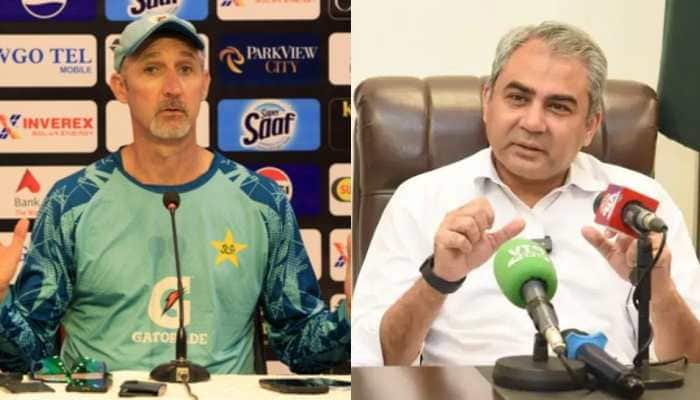Former Pakistan red-ball coach Jason Gillespie has once again turned the spotlight on Pakistan Cricket Board (PCB) chairman Mohsin Naqvi, questioning his leadership commitment in a stinging remark that has sent ripples through the cricketing community. Speaking on The Howie Games podcast, Gillespie revealed that while he and white-ball coach Gary Kirsten flew across continents to attend a vital team-building session in person, the PCB chief chose to dial in via Zoom—despite being located just minutes away from the venue in Lahore.
“Gary came up with this great idea of a Connection Camp… I flew in from Australia, Gary flew in from South Africa, the Chairman Mohsin Naqvi dialed in via Zoom. He is based in Lahore but did not come. We both felt the Chairman could not even drive 20 minutes to come here – that was a bit unusual,” Gillespie said, making his disappointment clear.
This public criticism reflects deeper issues plaguing the PCB’s internal dynamics and raises serious concerns about the board’s unity and direction—especially at a time when the national team desperately needs clear leadership and cohesion.
Held on September 23, 2024, the Connection Camp was a pivotal initiative aimed at strengthening communication, trust, and team bonding within Pakistan’s national cricket setup. Designed by Gary Kirsten, the session brought together key players including Babar Azam, Mohammad Rizwan, Fakhar Zaman, Saim Ayub, Shan Masood, Saud Shakeel, Salman Ali Agha, and Shadab Khan.
With both head coaches—Gillespie and Kirsten—physically present, the camp was meant to foster openness and alignment ahead of a crucial cricketing season. The absence of the board’s top figure from such a significant initiative sent a contradictory message that did not sit well with the coaching staff, hinting at possible disconnects between the PCB leadership and the team management.
In modern-day professional sports, symbolism and leadership visibility matter just as much as strategy. Gillespie’s remarks underscore the frustration many within the PCB’s inner circles have been feeling—about what they perceive as a lack of support and proactive involvement from the top brass. In the backdrop of Gillespie and Kirsten’s eventual resignations citing “authority issues” with the PCB, Naqvi’s absence from the camp appears less like an isolated oversight and more like a symptom of larger structural problems.
The fact that Naqvi stayed away despite being in Lahore, while both coaches flew thousands of miles, adds weight to Gillespie’s critique and further validates the narrative of growing dissatisfaction among high-level cricketing professionals working under the PCB’s current regime.
Meanwhile, the PCB’s recent announcement on changes within the men’s selection committee suggests that efforts are being made—however incrementally—to restructure and move forward. While Azhar Ali, Asad Shafiq, Aaqib Javed, and Aleem Dar retain their roles, the appointment of Usman Hashmi as a non-voting data analyst replacing Hassan Cheema indicates a subtle shift toward a more performance-driven selection approach.
Interestingly, PCB’s recent statement also pointed to a more inclusive team selection process, involving head coaches and team captains for each format—perhaps a move to prevent the kind of disenchantment that led to Gillespie and Kirsten’s resignations.







